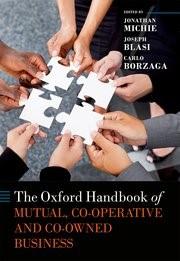The Oxford Handbook of Mutual, Co-operatives and Co-owned Business
Jonathan Michie, Joseph R. Blasi, Carlo Borzaga, The Oxford University Press, March 2017

The handbook investigates ‘member-owned’ organisations including consumer co-operatives, agricultural and producer co-operatives, worker co-operatives, mutual building societies, friendly societies, credit unions, solidarity organizations, mutual insurance companies, or employee-owned companies. This complex set of organizations is named differently across countries: from ‘mutuals’ in the United Kingdom, to ‘solidarity co-operatives’ in Latin America. In some countries, such organizations are not officially recognised.
These alternative corporate forms have emerged in a variety of economic sectors in almost all advanced economies since the time of the Industrial Revolution and the development of capitalism, through the subsequent creation and dominance of the limited liability company. Until recently, these organizations were generally regarded as a rather marginal component of the economy.
However, in recent years, they have come to be seen in some countries as potentially attractive in light of their ability to tackle various economic and social concerns, and their relative resilience during the financial and economic crises of 2007–2016.
Main contents of the book
Diversity and Complexity of member-owned enterprises
Rationale of co-operative enterprises
History of member-owned organisations
Co-operatives, mutual, member-owned, and employee-owned enterprises in the global economy
Political, governance, and orgniasational aspects
National case studies
Corporate and sector case studies
The future of co-operatives
* Summary from Oxford Handbooks Online
